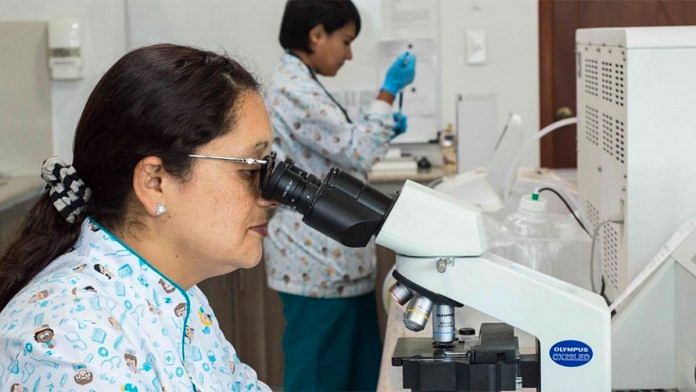New Delhi: Healthy human beings are likely to be infected with malaria, cholera, influenza, typhoid and other diseases as part of new trials meant to test the efficacy of preventive vaccines and curative drugs, ThePrint has learnt.
The Ministry of Health, along with the Ministry of Science & Technology, is looking at adopting Controlled Human Infection Model Studies (CHIMS) — a concept popular in the West — in the hope of making medical research quicker and more accurate.
“The model allows quick and efficient studies by using a small sample size of participants, said Dr Gagandeep Kang, a scientist who is often described as India’s ‘vaccine godmother’ and is spearheading the project.
“In these studies, products that are going to be failures will get the negative results early and expose fewer people to unsuccessful medical products,” she added. “It will give us an opportunity to evaluate more drugs and vaccines quickly.”
Kang, the first Indian woman scientist to join the Royal Society, London, is working with the Ministry of Science and Technology, the World Health Organisation, the Ministry of Health, and the Indian Council of Medical Research (ICMR). She is also the executive director at Translational Health Science and Technology Institute (THSTI), an autonomous institute under the Department of Biotechnology, Ministry of Science and Technology,
The CHIMS plan is likely to be rolled out by the end of 2020, Kang said.
“We are likely to start this project in the next one year. The discussions on changes in regulatory guidelines to allow scientists to import or manufacture the strains (to cause infections) are going on,” she added.
“We are waiting for regulatory guidance. I am hopeful to hear from Indian regulators by this December.”
Also Read: World’s first-ever malaria vaccine has just been rolled out in Africa
How human trials are conducted
For all the strides India has made, it continues to wield a heavy disease burden from afflictions such as cholera, malaria, dengue, etc, which affect millions every year.
The current trials for vaccines and drugs require a large number of test subjects — from hundreds for drugs, to thousands for vaccines where the disease is common, and even hundreds of thousands for vaccines where the disease is uncommon.
After participants are administered a test drug or vaccine, researchers check with them in two to five years, to see if they have contracted the infection concerned naturally.
For instance, if participants are given malaria vaccination, they are checked for natural malaria infection.
CHIMS, meanwhile, involve 200 to 500 participants. Before they participate, each respondent is subject to a rigorous examination and their medical history studied to ensure they do not develop any complications.
The participants are given the test vaccine, and, after a certain period, usually four weeks, infected with the strain of the disease the vaccine is supposed to guard against.
It could be a drink for cholera or typhoid, or a spray for influenza, and a mosquito bite or an injection for malaria.
If the vaccine works, the participants won’t contract the infection.
“The strain injected is a very well characterised, weak or completely treatable strain that we fully understand so we can predict what will happen,” said Kang, referring to concerns about infecting people with potentially deadly diseases.
“The goal is to make sure there is no risk to human life involved and the disease, if it happens, is mild and easily managed by the medical team,” she added.
All parameters are recorded from pre-vaccination to vaccination to post-vaccination, and participants carefully monitored. If the majority of participants get the infection despite the vaccine, it is considered failed.
A similar process is followed to check the efficiency of drugs. However, in this case, participants are first infected and then given the medicine.
Kang said she plans to involve reputed academic medical institutions such as the Jawaharlal Institute of Postgraduate Medical Education & Research, Pondicherry and Post Graduate Institute of Medical Education and Research, Chandigarh, for the trials.
“I have concerns about letting profit-led corporations lead these trials,” she added. “I would want academic institutions to lead the trials and not drug or vaccine manufacturing firms.”
‘Successful but controversial’
With global health facing the emergence of stronger and unknown pathogens over the last two decades, such as the recent outbreaks of Zika and Ebola, prominent donors such as the US-based Bill & Melinda Gates Foundation, and the UK-based Wellcome Trust as well as Medical Research Council (MRC) have invested in CHIM for early solutions.
The model has proven to be safe and highly cost-effective to study infectious diseases, “particularly those for which no animal model exists”, a paper published by Wellcome Open Research, a research publication platform, said last month.
“The number of CHIMS conducted worldwide has increased considerably in recent years, although few have been conducted in low and middle-income countries (LMICs), where infectious diseases have the greatest burden,” the paper said.
“…The controversial nature of conducting a human challenge with an infectious agent for which there is no therapeutic currently available and which may be associated with future, potentially serious, consequences, makes this a challenging prospect,” it added.
Also Read: Killer GM fungus helps scientists destroy 99% of malaria mosquitoes in 45 days



